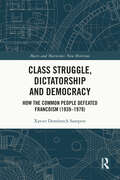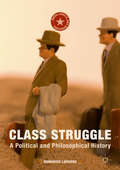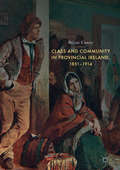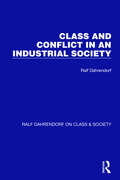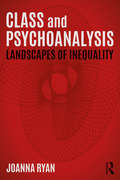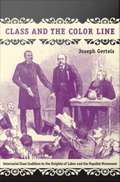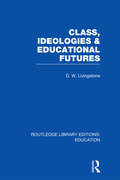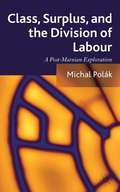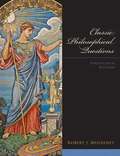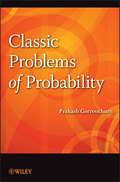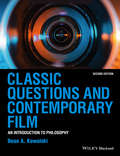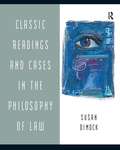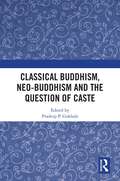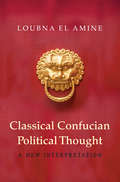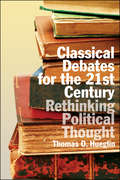- Table View
- List View
Class Strategies and the Education Market: The Middle Classes and Social Advantage
by Stephen J. BallClass Strategies and the Education Market examines the ways in which the middle classes maintain and improve their social advantages in and through education.Drawing on an extensive series of interviews with parents and children, this book identifies key moments of decision making in the construction of the educational trajectories of middle class children. Stephen J. Ball organises his analysis around the key concepts of social closure, social capital, values and principles and risk, while bringing a broad range of up-to-date sociological theory to bear upon his subject. From this thorough analysis, valuable and thought-provoking insights emerge into the assiduous care and considerable effort and expenditure which goes into ensuring the educational success of the middle class childThe middle classes are a sociological enigma, presenting the social researcher with considerable analytic and theoretical difficulties. Class Strategies and the Education Market provides a set of working tools for class analysis and the examination of class practices. Above all, it offers new ways of thinking about class theory and the relationships between classes in late modern society.
Class Struggle, Dictatorship and Democracy: How the Common People Defeated Francoism (1939-1979) (Marx and Marxisms)
by Xavier Domènech SampereIn Class Struggle, Dictatorship and Democracy: How the Common People Defeated Francoism (1939–1979), historian Xavier Domènech Sampere tells the story of Franco’s dictatorship, the struggle for freedoms and the foundations on which democracy was shaped. From the perspective of history from below and based on the analysis of the class struggle, Domènech offers not only a fascinating insight into the experiences of the workers who suffered one of the harshest and longest dictatorships in European history but also of the businessmen who benefited from it. The relationship between social movements and political change and the perspective of class conflict gives this book a unique perspective for understanding both the dictatorship and the arrival of democracy and its foundations.Published for the first time in English, Class Struggle, Dictatorship and Democracy: How the Common People Defeated Francoism (1939–1979) is a must read for all those interested in the history of fascism, social movements, and political transitions.
Class Struggle: A Political and Philosophical History (Marx, Engels, and Marxisms)
by Domenico LosurdoAvailable for the first time in English, this book examines and reinterprets class struggle within Marx and Engels’ thought. As Losurdo argues, class struggle is often misunderstood as exclusively the struggle of the poor against the rich, of the humble against the powerful. It is an interpretation that is dear to populism, one that supposes a binary logic that closes its eyes to complexity and inclines towards the celebration of poverty as a place of moral excellence. This book, however, shows the theory of class struggle is a general theory of social conflict. Each time, the most adverse social conflicts are intertwined in different ways. A historical situation always emerges with specific and unique characteristics that necessitate serious examination, free of schematic and biased analysis. Only if it breaks away from populism can Marxism develop the ability to interpret and change the world.
Class War: A Literary History
by Mark StevenA bold new history of the global class war A thrilling and vivid work of history, Class War weaves together literature and politics to chart the making and unmaking of social class through revolutionary combat. In a narrative that spans the globe and more than two centuries of history, Mark Steven traces the history of class war from the Haitian Revolution to Black Lives Matter. Surveying the literature of revolution, from the poetry of Shelley and Byron to the novels of Émile Zola and Jack London, exploring the writings of Frantz Fanon, Che Guevara, and Assata Shakur, Class War reveals the interplay between military action and the politics of class, showing how solidarity flourishes in times of conflict. Written with verve and ranging across diverse historical settings, Class War traverses industrial battles, guerrilla insurgencies, and anticolonial resistance, as well as large-scale combat operations waged against capitalism's regimes and its interstate system. In our age of economic crisis, ecological catastrophe, and planetary unrest, Steven tells the stories of those whose actions will help guide future militants toward a revolutionary horizon.
Class Warrior—Taoist Style
by Matt Reeck Abdelkéir KhatibiAbdelkébir Khatibi (1938–2009) is one of the most important writers and thinkers to emerge from North Africa in the second half of the twentieth century. Though not widely known beyond the Francophone world, Khatibi’s critical and creative works speak to the central concerns of postcolonial and postmodern life. Offered here in English for the first time, his long poem from 1976, Le lutteur de classe à la manière taoïste is a wildly inventive, transgressive, and important text. Class Warrior delivers a kind of free-verse Marxist handbook, written with the energy, movement, and style of a highly idiosyncratic Taoism. Matt Reeck’s compelling translation captures the stylistic and thematic beats of Khatibi’s verse, rendering the deceptively simple language of the original without losing its extraordinary layers and complexities. The introduction provides biographical context and an overview of Khatibi’s poetics of the orphan, a subject position that seeks to avoid authenticating notions of origins and that is also constantly restless and forever questing. This is a rich text for contemporary readers of poetry, as well as scholars of postcolonial theory.
Class and Community in Provincial Ireland, 1851–1914
by Brian CaseyThis book explores the experience of small farmers, labourers and graziers in provincial Ireland from the immediacy of the Famine until the eve of World War One. During this period of immense social and political change, they came to grips with the processes of modernisation. By focusing upon east Galway, it argues that they were not an inarticulate mass, but rather, they were sophisticated and politically aware in their own right. This study relies upon a wide array of sources which have been utilised to give as authentic a voice to the lower classes as possible. Their experiences have been largely unrecorded and this book redresses this imbalance in historiography while adding a new nuanced understanding of the complexities of class relations in provincial Ireland. This book argues that the actions of the rural working class and nationalists has not been fully understood, supporting E.P. Thompson’s argument that ‘their aspirations were valid in terms of their own experiences’.
Class and Conflict in an Industrial Society (Ralf Dahrendorf on Class & Society #1)
by Ralf DahrendorfOriginally published in England in 1959, this book evolves a new theory of conflict in industrial society. By way of illustrating and testing this theory, the book provides detailed analyses of various social phenomena. The author carries out a full critique of Marx in the light of history and modern sociology and discusses the theories of class-conflict of James Burnham, Fritz Croner and Karl Renner.
Class and Psychoanalysis: Landscapes of Inequality
by Joanna RyanDoes psychoanalysis have anything to say about the emotional landscapes of class? How can class-inclusive psychoanalytic projects, historic and contemporary, inform theory and practice? Class and psychoanalysis are unusual bedfellows, but this original book shows how much is to be gained by exploring their relationship. Joanna Ryan provides a comprehensively researched and challenging overview in which she holds the tension between the radical and progressive potential of psychoanalysis, in its unique understandings of the unconscious, with its status as a mainly expensive and exclusive profession. Class and Psychoanalysis draws on existing historical scholarship, as well as on the experiences of the author and other writers in free or low-cost projects, to show what has been learned from transposing psychoanalysis into different social contexts.It book describes how class, although descriptively present, was excluded from the founding theories of psychoanalysis, leaving a problematic conceptual legacy that the book attempts to remedy. Joanna Ryan argues for an interdisciplinary approach, drawing on modern sociological and psychosocial research to understand the injuries of class, the complexities of social mobility, and the defenses of privilege. She brings together contemporary clinical writings with her own research about class within therapy relationships to illustrate the anxieties, ambivalences and inhibitions surrounding class, and the unconsciousness with which it may be enacted. Class and Psychoanalysis breaks new ground in providing frameworks for a critical psychoanalysis that includes class. It will be of interest to anyone who wishes to think psychoanalytically about how we are intimately formed by class, or who is concerned with the inequalities of access to psychoanalytic therapies, or with the future of psychoanalysis.
Class and the Color Line: Interracial Class Coalition In the Knights of Labor and the Populist Movement
by Joseph GerteisA lauded contribution to historical sociology, Class and the Color Line is an analysis of social-movement organizing across racial lines in the American South during the 1880s and the 1890s. The Knights of Labor and the Populists were the largest and most influential movements of their day, as well as the first to undertake large-scale organizing in the former Confederate states, where they attempted to recruit African Americans as fellow workers and voters. While scholars have long debated whether the Knights and the Populists were genuine in their efforts to cross the color line, Joseph Gerteis shifts attention from that question to those of how, where, and when the movements' organizers drew racial boundaries. Arguing that the movements were simultaneously racially inclusive and exclusive, Gerteis explores the connections between race and the movements' economic and political interests in their cultural claims and in the dynamics of local organizing. Interpreting data from the central journals of the Knights of Labor and the two major Populist organizations, the Farmers' Alliance and the People's Party, Gerteis explains how the movements made sense of the tangled connections between race, class, and republican citizenship. He considers how these collective narratives motivated action in specific contexts: in Richmond and Atlanta in the case of the Knights of Labor, and in Virginia and Georgia in that of the Populists. Gerteis demonstrates that the movements' collective narratives galvanized interracial organizing to varying degrees in different settings. At the same time, he illuminates the ways that interracial organizing was enabled or constrained by local material, political, and social conditions.
Class, Culture and Education (Routledge Library Editions: Education)
by Harold EntwistleThis book examines the concepts of equality, class, culture, work and leisure and explores their interrelationship through the discussion of some current problems, especially the problems posed for schools for the ‘culturally deprived.’ The debate about differential provision of schooling for different social groups is taken up through examination of the assumption that schools are middle-class institutions, and the claims and counter claims about the possibility of there being a common culture as the basis for a common curriculum in comprehensive schools. The concept of culture and, especially the meaning of working-class culture receives examination in this context as well as the thesis that any sub-culture constitutes an adequate or valid way of life.
Class, Ideologies and Educational Futures (Routledge Library Editions: Education)
by D W. LivingstoneThis book provides a systematic and detailed analysis of class relations in advanced capitalist societies as a basis for understanding both class differences in educational practices and the relative effects of class and other social background factors on public attitudes toward education. Secondly, the book offers an empirically-grounded summary of the contending educational ideologies in advanced capitalism, through a discourse analysis of the public statements of spokes-persons for major class groupings. Thirdly, using the data from several public opinion surveys in Ontario, profiles of public attitudes on critical education issues are interpreted in terms of the actual effects of class and other social background factors, as well as the mediating influences of contending ideologies. Finally a general approach and array of tactics for creating practical alternative educational and social futures are illustrated through the book.
Class, Surplus, and the Division of Labour: A Post-Marxian Exploration
by Michal PolákThe traditional Marxian picture of a two-class polarisation seems far removed from today's diverse society. Re-examining the very foundations of the Marxian theory in the process, the author argues that important critiques can fruitfully be understood and to accomplish the goal, he extends the traditional concepts in innovative and original ways.
Classic American Philosophers
by Max H. FischIt is increasingly apparent that American philosophy has had its classical period, corresponding to the Greek classical period - Democritus through Aristotle. America's classical period began just after the Civil War and ended just before the Second World War. Its canon is already nearly fixed, and it includes six philosophers: Charles Sanders Pierce, William James, Josiah Royce, George Santayana, John Dewey, and Alfred North Whitehead. The primary purpose of this volume is to introduce these philosophers to readers who do not yet know their writings at first hand. The writings of each of these philosophers is enhanced by a thoughtful introduction to each. The volume as a whole is framed by a detailed introduction exploring these philosophers' place in America's Classic Period of Philosophy. The book is perfect for beginning students of or enthusiasts about American Philosophy and philosophy in general. The text is followed by an appendix which makes suggestions for further readings produced by these classic American philosophers.
Classic And Contemporary Readings In The Philosophy Of Education
by Steven M. CahnNow even more affordably priced in its second edition, Classic and Contemporary Readings in the Philosophy of Education is ideal for undergraduate and graduate philosophy of education courses. Editor Steven M. Cahn, a highly respected contributor to the field, brings together writings by leading figures in the history of philosophy and notable contemporary thinkers. The first section of the book provides material from nine classic writers: Plato, Aristotle, Locke, Rousseau, Kant, Wollstonecraft, Mill, Whitehead, and Dewey. Their historically important works encourage students to view current issues and debates from broad perspectives. The second section presents twenty-one recent selections that reflect diverse approaches, including pragmatism, analytic philosophy, feminism, and multiculturalism. The readings are substantial or complete texts, not fragments. The second edition of Classic and Contemporary Readings in the Philosophy of Education features expanded selections by Locke, Rousseau, Kant, and Dewey, along with eight new readings: * Mary Wollstonecraft, "A Vindication of the Rights of Woman" (excerpt) * Patricia Heidenry, "Home Is Where the School Is" * Joseph S. Spoerl, "Justice and the Case for School Vouchers" * Jeffrey R. Henig, "Rethinking School Choice" * John Passmore, "The Concept of Teaching" * Michel Foucault, "Discipline and Punish" (excerpt) * Steven M. Cahn, "Guiding, Grading, and Guarding" * Martha Nussbaum, "Cultivating Humanity" (excerpt) Offering unprecedented breadth and depth of coverage, Classic and Contemporary Readings in the Philosophy of Education, Second Edition, is the most inclusive, thorough, and accessible introduction to the field.
Classic Philosophical Arguments: The Brain in a Vat
by Goldberg Sanford C.The scenario of the brain in a vat, first aired thirty-five years ago in Hilary Putnam's classic paper, has been deeply influential in philosophy of mind and language, epistemology, and metaphysics. This collection of new essays examines the scenario and its philosophical ramifications and applications, as well as the challenges which it has faced. The essays review historical applications of the brain-in-a-vat scenario and consider its impact on contemporary debates. They explore a diverse range of philosophical issues, from intentionality, external-world scepticism, and the nature of truth, to the extended mind hypothesis, reference magnetism, and new versions of realism. The volume will be a rich and valuable resource for advanced students in metaphysics, epistemology, and philosophy of mind and language, as well as anyone interested in the relations between language, thought and the world.
Classic Philosophical Arguments: The Original Position
by Timothy HintonAt the centre of John Rawls's political philosophy is one of the most influential thought experiments of the twentieth century: which principles of justice would a group of individuals choose to regulate their society if they were deprived of any information about themselves that might bias their choice? In this collection of new essays, leading political philosophers examine the ramifications and continued relevance of Rawls's idea. Their chapters explore topics including the place of the original position in rational choice theory, the similarities between Rawls's original position and Kant's categorical imperative, the differences between Rawls's model and Scanlon's contractualism, and the role of the original position in the argument between Rawls and other views in political philosophy, including utilitarianism, feminism, and radicalism. This accessible volume will be a valuable resource for undergraduates, as well as advanced students and scholars of philosophy, game theory, economics, and the social and political sciences.
Classic Philosophical Questions
by Robert MulvaneyClassic Philosophical Questions has presented decades of students with the most compelling classic and contemporary primary source readings on the most enduring and abiding questions in philosophy. Classic Philosophical Questions is a longstanding and highly respected anthology of basic readings in philosophy, taken from ancient, modern, and contemporary sources. Issues are treated in a fundamentally open manner with arguments pro and con for the various positions covered. All selections are taken from primary sources, with introductions and study guides to facilitate reading for the beginning student.
Classic Problems of Probability
by Prakash GorroochurnWinner of the 2012 PROSE Award for Mathematics from The American Publishers Awards for Professional and Scholarly Excellence."A great book, one that I will certainly add to my personal library."--Paul J. Nahin, Professor Emeritus of Electrical Engineering, University of New HampshireClassic Problems of Probability presents a lively account of the most intriguing aspects of statistics. The book features a large collection of more than thirty classic probability problems which have been carefully selected for their interesting history, the way they have shaped the field, and their counterintuitive nature.From Cardano's 1564 Games of Chance to Jacob Bernoulli's 1713 Golden Theorem to Parrondo's 1996 Perplexing Paradox, the book clearly outlines the puzzles and problems of probability, interweaving the discussion with rich historical detail and the story of how the mathematicians involved arrived at their solutions. Each problem is given an in-depth treatment, including detailed and rigorous mathematical proofs as needed. Some of the fascinating topics discussed by the author include:Buffon's Needle problem and its ingenious treatment by Joseph Barbier, culminating into a discussion of invarianceVarious paradoxes raised by Joseph BertrandClassic problems in decision theory, including Pascal's Wager, Kraitchik's Neckties, and Newcomb's problemThe Bayesian paradigm and various philosophies of probabilityCoverage of both elementary and more complex problems, including the Chevalier de Méré problems, Fisher and the lady testing tea, the birthday problem and its various extensions, and the Borel-Kolmogorov paradoxClassic Problems of Probability is an eye-opening, one-of-a-kind reference for researchers and professionals interested in the history of probability and the varied problem-solving strategies employed throughout the ages. The book also serves as an insightful supplement for courses on mathematical probability and introductory probability and statistics at the undergraduate level.
Classic Questions and Contemporary Film
by Dean KowalskiFeaturing significant revisions and updates, Classic Questions and Contemporary Film: An Introduction to Philosophy, 2nd Edition uses popular movies as a highly accessible framework for introducing key philosophical concepts Explores 28 films with 18 new to this edition, including Eternal Sunshine of the Spotless Mind, Hotel Rwanda, V for Vendetta, and Memento Discusses numerous philosophical issues not covered in the first edition, including a new chapter covering issues of personal identity, the meaningfulness of life and death, and existentialism Offers a rich pedagogical framework comprised of key classic readings, chapter learning outcomes, jargon-free argument analysis, critical thinking and trivia questions, a glossary of terms, and textboxes with notes on the movies discussed Revised to be even more accessible to beginning philosophers
Classic Readings and Cases in the Philosophy of Law
by Susan DimockWith over sixty cases as support, this text presents the philosophy of law as a perpetual series of debates with overlapping lines and cross connections. Using law as a focus to bring into relief many social and political issues of pressing importance in contemporary society, this book encourages readers to think critically and philosophically. Classic Readings and Cases in the Philosophy of Law centers on five major questions: What is law? What, if any, connection must there be between law and morality? When should law be used to restrict the liberty of individuals? To what extent should democratic states permit civil disobedience? What, if anything, justifies the infliction of punishment on those who violate the law? The extensive anthology of cases covers the mundane to the grandest of constitutional issues, including controversial topics like ownership of genetic material, capital punishment, and gay rights. Brief introductions to each case describe the central issue being litigated, the legal reasoning of the justices–both majority and dissenting–the decision of the court, and its philosophical significance.
Classical Arabic Philosophy: An Anthology of Sources
by Jon Mcginnis David C. ReismanThis volume introduces the major classical Arabic philosophers through substantial selections from the key works (many of which appear in translation for the first time here) in each of the fields--including logic, philosophy of science, natural philosophy, metaphysics, ethics, and politics--to which they made significant contributions. An extensive Introduction situating the works within their historical, cultural, and philosophical contexts offers support to students approaching the subject for the first time, as well as to instructors with little or no formal training in Arabic thought. A glossary, select bibliography, and index are also included.
Classical Buddhism, Neo-Buddhism and the Question of Caste
by Pradeep P. GokhaleThis book examines the interface between Buddhism and the caste system in India. It discusses how Buddhism in different stages, from its early period to contemporary forms—Theravāda, Mahāyāna, Tantrayāna and Navayāna—dealt with the question of caste. It also traces the intersections between the problem of caste with those of class and gender. The volume reflects on the interaction between Hinduism and Buddhism: it looks at critiques of caste in the classical Buddhist tradition while simultaneously drawing attention to the radical challenge posed by Dr B. R. Ambedkar’s Navayāna Buddhism or neo-Buddhism. The essays in the book further compare approaches to varṇa and caste developed by modern thinkers such as M. K. Gandhi and S. Radhakrishnan with Ambedkar’s criticisms and his departures from mainstream appraisals. With its interdisciplinary methodology, combining insights from literature, philosophy, political science and sociology, the volume explores contemporary critiques of caste from the perspective of Buddhism and its historical context. By analyzing religion through the lens of caste and gender, it also forays into the complex relationship between religion and politics, while offering a rigorous study of the textual tradition of Buddhism in India. This book will be useful to scholars and researchers of Indian philosophy, Buddhist studies, Indology, literature (especially Sanskrit and Pāli), exclusion and discrimination studies, history, political studies, women studies, sociology, and South Asian studies.
Classical Chinese for Everyone: A Guide for Absolute Beginners
by Bryan W. Van NordenIn just thirteen brief, accessible chapters, this engaging little book takes "absolute beginners" from the most basic questions about the language (e.g., what does a classical Chinese character look like?) to reading and understanding selections from classical Chinese philosophical texts and Tang dynasty poetry. "An outstanding introduction to reading classical Chinese. Van Norden does a wonderful job of clearly explaining the basics of classical Chinese, and he carefully takes the reader through beautifully chosen examples from the textual tradition. An invaluable work." —Michael Puett, Harvard University
Classical Confucian Political Thought
by Loubna El AmineThe intellectual legacy of Confucianism has loomed large in efforts to understand China's past, present, and future. While Confucian ethics has been thoroughly explored, the question remains: what exactly is Confucian political thought? Classical Confucian Political Thought returns to the classical texts of the Confucian tradition to answer this vital question. Showing how Confucian ethics and politics diverge, Loubna El Amine argues that Confucian political thought is not a direct application of Confucian moral philosophy. Instead, contrary to the conventional view that Confucian rule aims to instill virtue in all members of society, El Amine demonstrates that its main aim is to promote political order.El Amine analyzes key aspects of the Confucian political vision, including the relationship between the ruler and the people, the typology of rulers, and the role of ministers and government officials. She also looks at Confucianism's account of the mechanisms through which society is to be regulated, from welfare policies to rituals. She explains that the Confucian conception of the political leaves space open for the rule of those who are not virtuous if these rulers establish and maintain political order. She also contends that Confucians defend the duty to take part in government based on the benefits that such participation can bring to society.Classical Confucian Political Thought brings a new understanding to Confucian political theory by illustrating that it is not chiefly idealistic and centered on virtue, but rather realistic and driven by political concerns.
Classical Debates for the 21st Century: Rethinking Political Thought
by Thomas HueglinClassical Debates for the 21st Century distinctively reconsiders the canon of political thought, in the context of current world events, by presenting debates between the ideas of classical theorists. It is through these debates that Thomas O. Hueglin argues that exclusive state sovereignty, individual citizenship, and majority rule have become questionable categories of political theory and practice in a globalizing world. To a large extent, the classical canon of political thought has been constructed in order to give legitimacy to these categories, but it is time to rethink the validity of that canon, and to search for alternative voices and traditions that emphasize plurality, shared sovereignty, and complex patterns of representation and decision-making. This does not mean that the familiar names in the classical canon have to disappear. But they should be examined more critically for their continued importance, and additional theorists thus far neglected should complement them. Each chapteris organized as a debate between two theorists with contrasting views and approaches. At the end of each chapter, there is a critical evaluation of these political theorists’ continued or renewed relevance.

